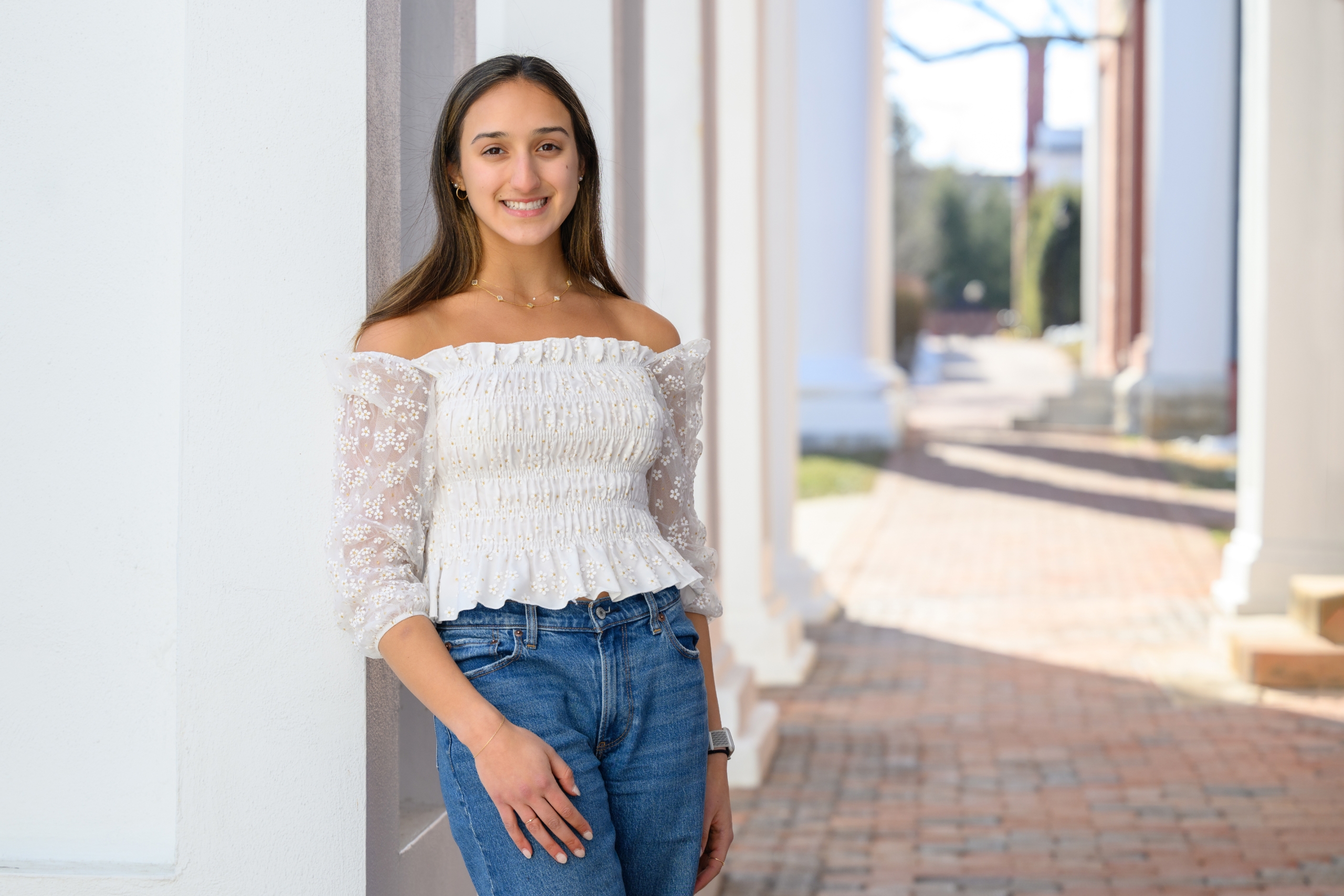Meet Sofia Iuteri ’27 Iuteri’s work with the Connolly Entrepreneurship Society and business administration professors has led to the expansion and growth of her own nonprofit.

Sofia Iuteri ’27
Hometown: Greenwich, Connecticut
Majors/minors: Economics and environmental studies double major; entrepreneurship minor
Where is your “home” on campus?
I feel most at home on back campus, especially at the gazebo. Back campus is the perfect place for a hike with a friend, a solo walk to clear my mind or just to get outside and enjoy the fresh air. For me, it’s a place of serenity. The scenery is unbeatable, and it’s an ideal setting for deep conversations, quiet reflection or a fun afternoon. Having a space on campus where I can process my successes and setbacks, or simply sit with my thoughts, is incredibly meaningful. Whether I go to meditate, stargaze or enjoy a back campus bonfire with friends, the gazebo offers a peaceful escape from the beautiful chaos of main campus life.
What has been your most impactful experience at W&L, either on or off-campus?
Being part of the Connolly Entrepreneurship Society (CES) has been one of my most impactful experiences at W&L. As vice president of business development, I’ve honed my strategic thinking and problem-solving skills by consulting student start-ups on key growth areas, from raising capital to establishing partnerships and refining pitch strategies. In October 2024, I had the opportunity to attend an entrepreneurship conference in Tampa, Florida, which was an eye-opening experience. It reinforced the importance of bringing external insights back to our campus to strengthen the internal processes of our own entrepreneurial ecosystem.
Have you found a mentor on campus? Who is it, and how have they helped you develop as a student?
Both Jay Margalus (Johnson Professor of Entrepreneurship and Leadership and director of the Connolly Center for Entrepreneurship) and Emily Landry (assistant professor of business administration) have been incredible mentors to me. Professor Margalus is my entrepreneurship minor adviser and a mentor to me as a member of the executive board for the Entrepreneurship Society. Professor Margalus encourages me to push myself beyond what I thought were my limits. He has fostered and believed in my viable ideas when they were nothing but a few bullet points on a piece of paper. And, most importantly, he has taught me the value of asking questions as opposed to seeking immediate answers.
Emily Landry has played a pivotal role in my growth as a nonprofit founder and leader in social entrepreneurship. After three years of running Hats4Healing, I faced a critical decision: Maintain the status quo or invest in sustainable growth. Through my conversations with Professor Landry, I realized the potential for expansion, leading me to secure a $6,000 Johnson Opportunity Grant to create beginner knitting kits and launch an event that sold 25 kits. This decision transformed Hats4Healing from a passion project into a scalable nonprofit. Today, we’ve donated over 2,700 hats and built a global volunteer community of more than 250 people. Her guidance has helped me develop skills in project management, mission development, product prototyping and navigating the legal complexities of nonprofit status. The heartfelt letters and photos I receive from hospitals and volunteers remind me of the power of determination and the ability of young leaders to drive meaningful change.
What was your favorite class and why?
My favorite class so far has been assistant professor of earth and environmental geoscience Nicholas Barber’s Volcanoes of Yellowstone Spring Term course. It was my first Spring Term class and combined two weeks of on-campus learning with two weeks of travel to Yellowstone National Park, Oregon and Washington. Not only did I form lifelong friendships, but I also explored the field of geology — something I likely wouldn’t have encountered otherwise. From studying volcanic functions and historic case studies in the classroom to observing real-world volcanoes, waterfalls and wildlife, I was constantly in awe. This immersive field experience reinforced the value of integrating interdisciplinary subjects into my academic journey, even those outside my major.
What are your hobbies/interests? How has W&L helped you develop and pursue them?
One of my favorite pastimes is both analytical and creative writing. I’ve channeled this passion into The Experience Exchange, a student-run print magazine dedicated to reconnecting the W&L and local communities with nature. I founded The Experience Exchange as a way to combine my love for writing and environmental advocacy in a structured, impactful way. The magazine is an active effort to combat the “extinction of experience” — a growing global phenomenon where people are becoming increasingly disconnected from nature, leading to a diminished incentive to protect it.
What do you like about being a DIII athlete?
After a decade of competitive gymnastics — training up to 36 hours a week as a Junior Olympic Level 10 gymnast — I’ve come to really appreciate the work-life balance of being a DIII athlete. The camaraderie on the track and field team has been one of the most valuable aspects of my experience, providing an instant community of driven, hardworking teammates. Traveling regionally for meets and competing alongside them has been incredibly rewarding, not just in terms of performance but in the lasting friendships I’ve built along the way.
Fun facts:
I was a Junior Olympic Level 10 gymnast and trained and competed for 10 years. I am scuba-certified and love exploring underwater life.

You must be logged in to post a comment.